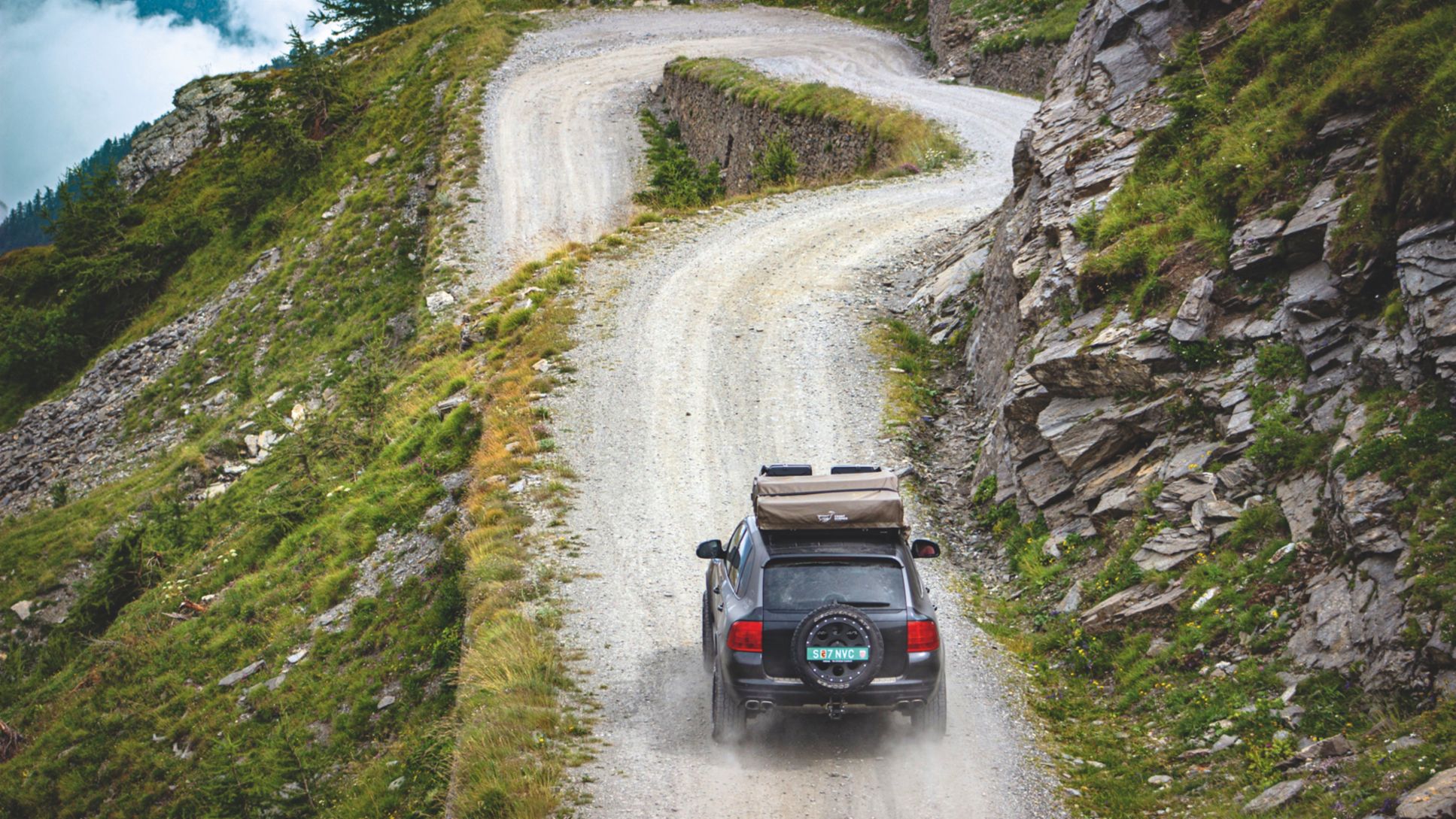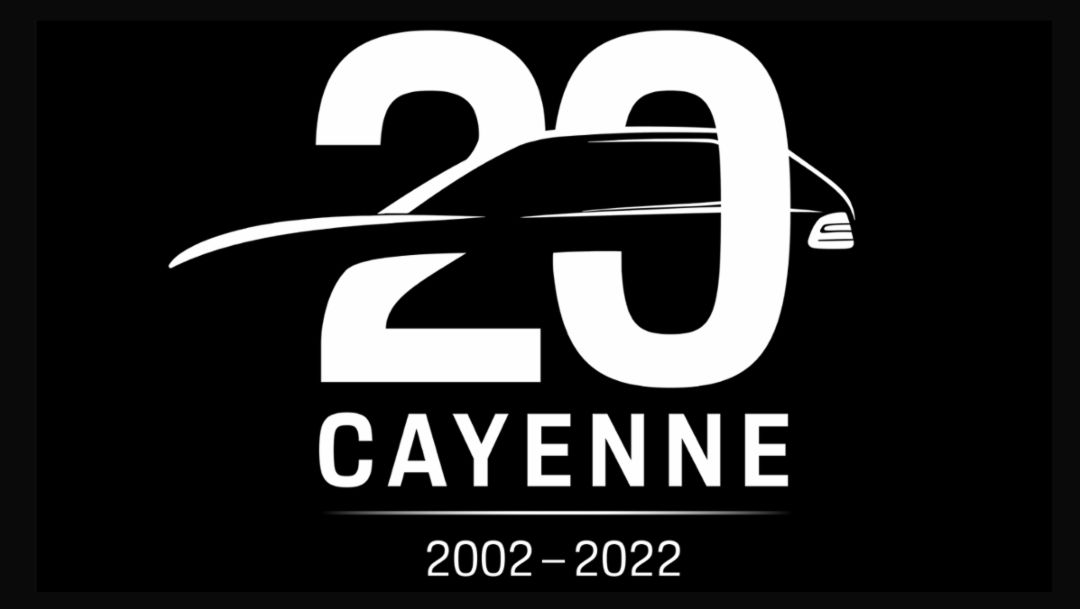It’s not very often that 20-year-olds change the world. At the very least, the Cayenne has managed to turn the Porsche world upside down. The sports car manufacturer had high hopes for the “third Porsche” – after the Boxster and 911 (type 996) – when it launched in 2002. The Cayenne was designed to tap into new markets and thus secure the company’s future over the long term.
Twenty years later, we now know that the Cayenne far exceeded these high expectations. The Porsche SUV helped shape the segment of ultra-sporty off-roaders that was still young at the time, and its impressive success has opened up new options for the market itself. In addition to two-door sports cars, there’s now also a range of highly dynamic four-door vehicles to choose from: the Cayenne was followed by the Panamera, the Macan, and the all-electric Taycan.
With the third generation launched in 2017, the Cayenne is available in a variety of variants and has proven itself to be a family-friendly travel vehicle, robust off-roader, and spacious sports car. And it can do so much more. The sky’s the limit. See for yourself!
Camera Car
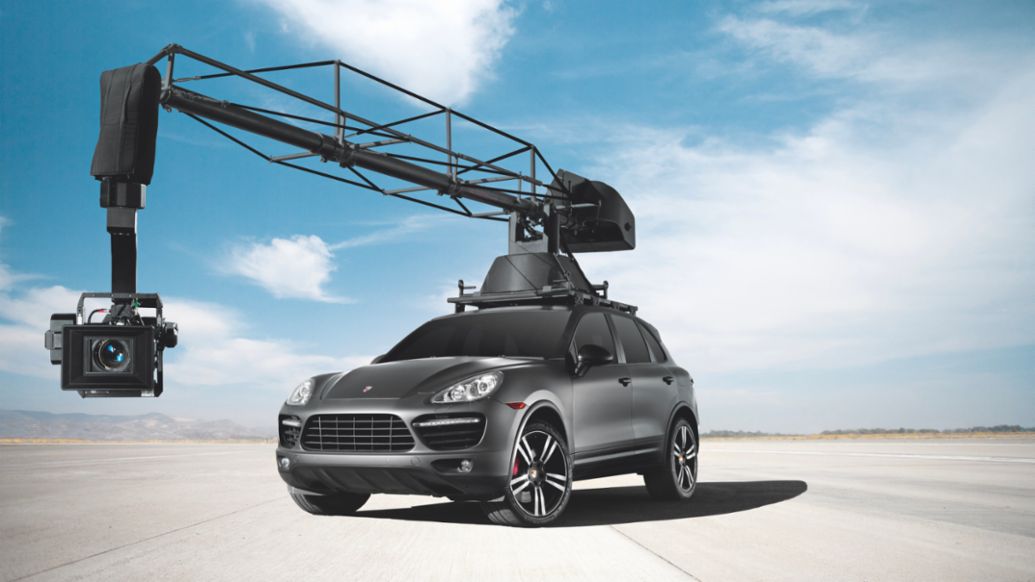
Action films rely on movement, whether wild car chases, dynamic stunts, or high-speed parallel driving. And the more breathtaking the scene is, the higher the suspense. Engineer Anatoliy Kokush, who hails from Ukraine, developed the ultimate system for thrilling scenes like these in the 1980s. The Russian Arm can be rotated 360 degrees via remote control, and the camera tilted in all directions – even at vehicle speeds of up to 150 kmh. It goes without saying that the Cayenne with its dynamic characteristics is the ideal basis for this high-tech crane. As a real Porsche, it’s not only fast and agile, but also offers enough space for the film crew. Kokush received an Oscar for his invention in 2006.
Model: Porsche Cayenne Turbo, built in 2014
Specialization: The Russian Arm – the remote-controlled crane arm is four to approximately seven meters long, and the 360-degree rotating camera is stabilized electronically to compensate for any vibrations. Total system weight: about 180 kg.
Camper
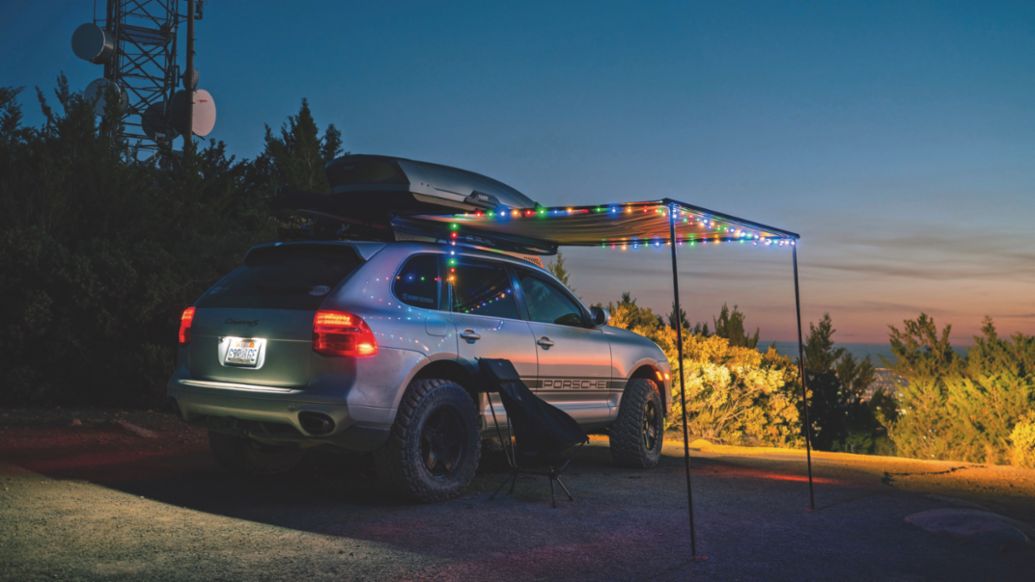
Even when he was in the US Navy, Harrison Schoen never stuck around long at any one location. And over the years, he’d even gotten used to tight living quarters on aircraft carriers. With his military service behind him, he came up with the idea of converting a Cayenne into a mobile home in spring 2021. “I came to realize how short life is,” explains Schoen. “And if I have the opportunity to keep moving and make a living along the way, I should do it.” He has been sleeping in the car ever since, cooking on a camping stove and bathing under a roof-mounted shower. Schoen has since completed some of the most difficult tours in the western United States and set himself the goal of visiting every national park in the US. He documents his adventures on his YouTube channel Harrison Schoen and other social media platforms.
Model: Porsche Cayenne, built in 2008
Specialization: Three-inch lift kit, 18-inch wheels with all-terrain tires (33 x 12.5 inch), roof box, canopy with disco lighting, plank bed inside.
Safety Car
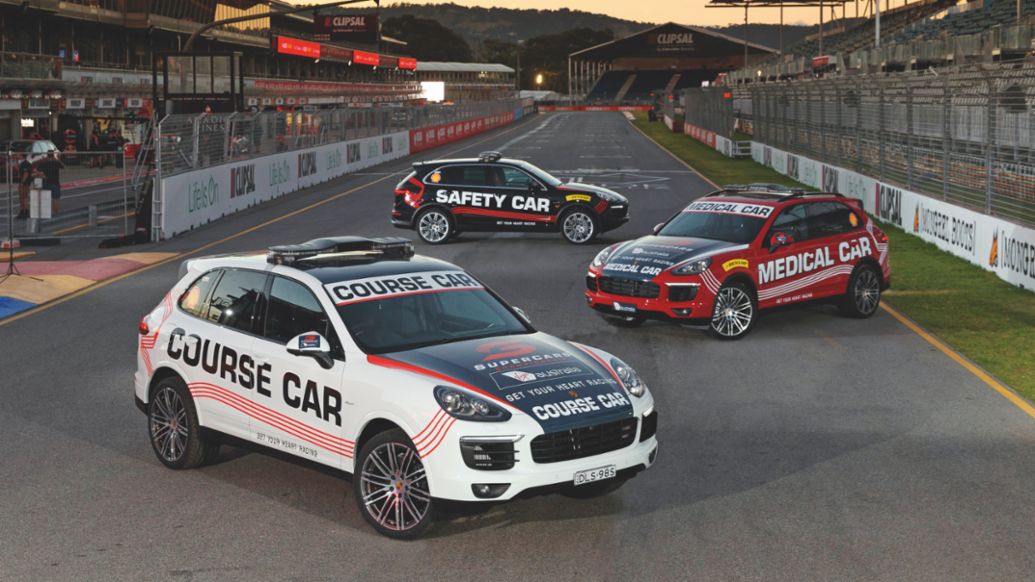
In 2017, Porsche Cars Australia provided three Cayenne for the Supercars Championship, the most popular Australian racing series for touring cars, and thus demonstrated that even the brand’s largest SUV feels right at home on the racecourse. Two vehicles equipped with a 4.2-liter V8 turbo diesel engine served as safety and medical car, while a Cayenne Diesel Platinum Edition assumed the role of course car.
Model: Porsche Cayenne S Diesel, built in 2017. Porsche Cayenne Diesel Platinum Edition, built in 2017
Specialization: A custom decal and emergency vehicle lighting on the roof help with quick identification in case of emergency.
Safari Car
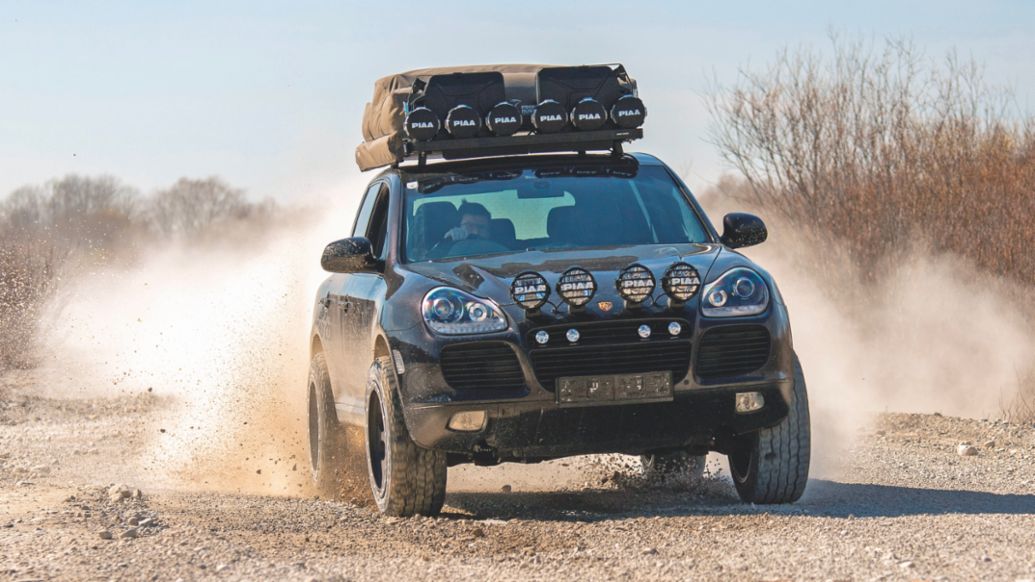
The Cayenne is robust, reliable, and blessed with all-wheel drive, differential locks, and high ground clearance, so why wouldn’t you use it for expeditions? South African Shane Oosthuizen had precisely this idea and was interested in driving the full length of Africa with his fiancée. However, the pandemic got in the way of his plans, which is why the two of them drove the car from Austria, where it had been converted, across Europe to the Netherlands and had it shipped from there to South Africa. The Oosthuizens have since driven across their home country, including Lesotho and Botswana. They’ve already covered around 100,000 kilometers in Africa and Europe, with more adventures to come.
Model: Porsche Cayenne Turbo, built in 2004
Specialization: Increased ground clearance for the all-terrain tires, roof rack with additional 40-liter tank, roof tent, and pull-out awning. A 12-volt refrigerator and digital sound system ensure comfort.
Ambulance
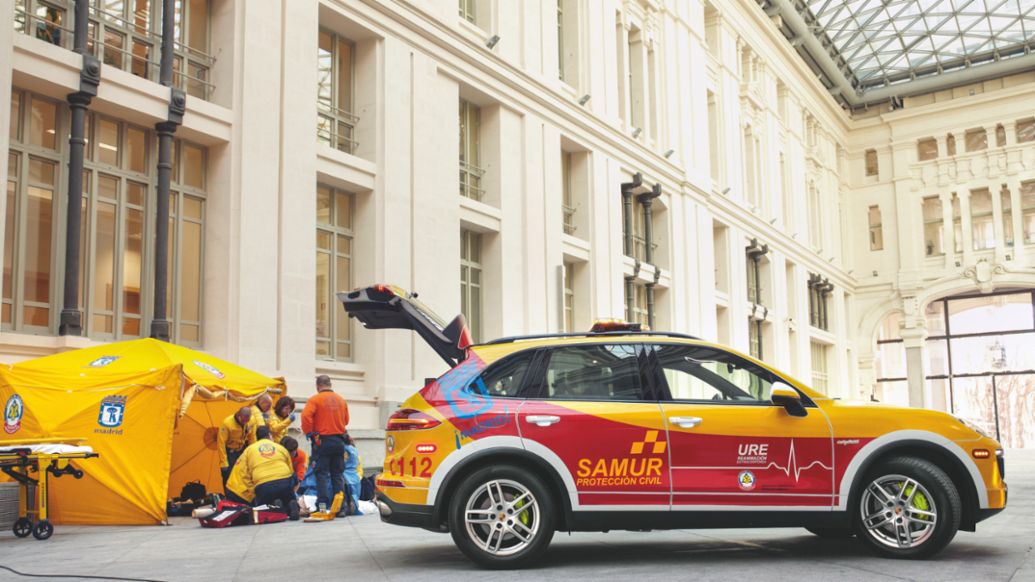
Cardiac arrest requires immediate action. The Servicio de Asistencia Municipal de Urgencia y Rescate (SAMUR) emergency service in Madrid has been using an extraordinary ambulance since 2015 that’s equipped specifically for these critical cases. The Cayenne S E-Hybrid features extracorporeal membrane oxygenation (ECMO) equipment that supports and can even take over heart and lung function, making it possible to keep someone who has suffered a heart attack alive for longer. Porsche Ibérica donated the four-door sports car for this globally unique project dedicated to improving medical intervention in the event of cardiac arrest. The vehicle’s specific characteristics are perfectly suited for this application: the Cayenne S E-Hybrid is fast and agile, and yet spacious enough to contain the necessary equipment. And it can even be electrically powered in certain circumstances on the streets of Madrid.
Model: Porsche Cayenne S E-Hybrid, built in 2015
Specialization: The extracorporeal membrane oxygenation (ECMO) equipment was like no other worldwide upon delivery of the vehicle and can be used to maintain circulation in the event of cardiac arrest.
